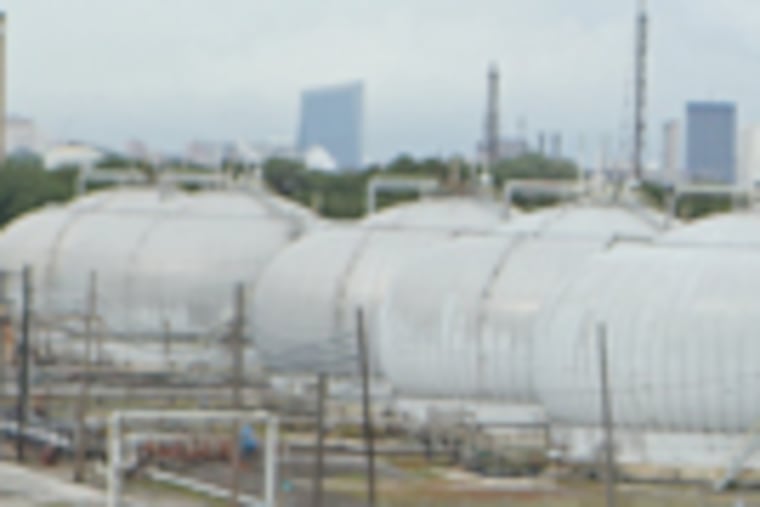PhillyDeals: In warehouses, the future is looking up
Philadelphia's industrial future: High-rise, robot-driven warehouses, with lots of trucks zooming in and out. Teva Pharmaceuticals this summer chose Northeast Philadelphia over suburban sites for its 125-foot-tall, $300 million drug-warehouse complex, in large part because the city's zoning for the site allowed high-rise buildings, unlike suburban townships.

Philadelphia's industrial future: High-rise, robot-driven warehouses, with lots of trucks zooming in and out.
Teva Pharmaceuticals this summer chose Northeast Philadelphia over suburban sites for its 125-foot-tall, $300 million drug-warehouse complex, in large part because the city's zoning for the site allowed high-rise buildings, unlike suburban townships.
Now the city Planning Commission is supporting Councilman Jim Kenney's bill to more than double height limits in parts of South Philadelphia - to 140 feet - to accommodate higher warehouses. A privately run warehouse, with the Pennsylvania Liquor Control Board as a tenant, is one possible development.
And the Philadelphia Industrial Development Corp., a partnership between the city and the Chamber of Commerce that manages city-owned sites, wants to attract similar projects to other properties, says executive director John Grady.
PIDC would like to interest potential high-rise warehouse users in property around the Sunoco oil refinery, which the company plans to sell or close, and other industrial ground on both sides of the lower Schuylkill near Philadelphia International Airport and the I-95/I-76 split. A few other large, vacant properties, including the former Internal Revenue Service office sites on Roosevelt Boulevard, could be in play.
Automated equipment, robotics and logistics software that make it possible to speedily grab and move boxes without direct human contact have made bigger warehouses a possibility.
"The height of single-story warehouses has increased dramatically," PIDC representative Thomas Dalfo testified before the Planning Commission last month. "Unheard of in the U.S. a decade ago, warehouses with heights of 80, 90 or more than 100 feet are becoming common."
Warehouse investors are also attracted by a project to widen the Panama Canal, which will make it easier to move cargoes by sea between the West Coast and Asia, and Philadelphia and other East Coast ports, compared to rail or long-haul trucking, says Deputy Mayor Alan Greenberger.
No quick remedy
This is all good for Philadelphia jobs and taxes, right?
It's a lot better than nothing, but not all you might expect.
At automated warehouses, headcount reaches the low hundreds - around 200 each, at least initially, at both the Teva and the LCB sites.
That's a fraction of the 1,000 or so full-time jobs (and 2,000 or more Christmas-season temporary jobs) at each of the new "pick-and-pack" shipping warehouses Amazon.com has built, or is planning to build, in Middletown, Del., and on the edges of the Allentown and Harrisburg areas.
Amazon fills huge volumes of complex orders by hand. It's been selecting semi-rural sites with plenty of low-wage labor, bypassing big cities like Philadelphia, even though they, too, have high unemployment. For international shippers, like drug exporters and wine importers, the city may have greater advantages, with its port, rail and highway connections, longtime industrial zoning and willingness to change rules.
Property-tax receipts won't be pouring in as an immediate result of the new construction, either.
As Greenberger reminded me, Philadelphia gives 10-year tax abatements for new construction.
Booze barn
The Liquor Control Board, the state liquor- and wine-sales agency that
Gov. Corbett
wants to privatize, has asked for proposals to build one big warehouse to replace the three current privately operated warehouses across the state that collect and ship State Stores bottles. The move comes just as the PLCB is getting into the online-sales business.
Anthony A. Cerone, owner of XTL Inc. (as in Xpress Truck Lines, another Cerone business), wants to build that warehouse on the city-owned property along Third Street, between Packer and Oregon Avenues in South Philadelphia. The space was vacated by the Produce Center when it moved to a new state-financed facility in Southwest Philadelphia. XTL is also looking at private-sector tenants for other parts of the site, PIDC's Grady said.
Cerone's group has operated one of the three existing LCB warehouses, on Enterprise Avenue near Philadelphia International Airport, under a series of LCB contracts, starting in the 1980s.
In the last 10 years Cerone has given a total of more than $100,000 for state campaigns by Democrats Vincent Fumo (who as state senator directed state funding for the Produce Center move), Robert P. Casey Jr., and Ed Rendell, and Republicans Corbett and Mike Fisher, among others, according to state records.
Cerone didn't return calls to his office seeking comment on the warehouse. LCB officials declined to comment.
Grady says he's confident that, where warehouses go, jobs will follow. He pointed to the decade-old TJ Maxx warehouse complex in Northeast Philly, which employs 1,400. The city wants more like that, he said.
Though robots are replacing packers, the trucks that fill and empty warehouses still need human operators. Trucking jobs pay a living wage - $45,000 or $50,000 a year for experienced drivers - and don't require a lot of prior education, Grady noted.